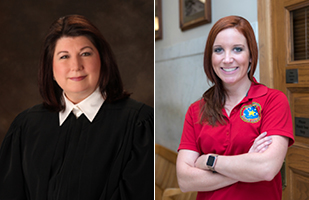Serving Those Who Served: Founding Veterans Court Celebrates 10 Years

Honor Court Judge Taryn Heath (left) and director Lisa Williams (right) have become leaders for treatment courts across Ohio during their decade of service to veterans.

Honor Court Judge Taryn Heath (left) and director Lisa Williams (right) have become leaders for treatment courts across Ohio during their decade of service to veterans.
A decade ago, members of Stark County Common Pleas Court followed their instincts to start Ohio’s first felony veterans treatment program.
As Honor Court commemorates its 10th anniversary, it leads the way for the dozens of other veterans courts in the state.
Judge Taryn Heath and program director Lisa Williams remain as pillars of the initiative they started on May 27, 2011.
“From the start, you have this really profound respect for these men and women for what they’ve sacrificed, which leads to an extreme willingness to help them,” said Williams.
New Approach to an Old Problem
The seeds for Honor Court were first planted after staff noticed a high volume of veterans facing serious criminal charges. A conference that introduced coordinators to Judge Robert Russell, who started the nation’s first veterans treatment court (VTC) in Buffalo in 2008, gave Judge Heath and her staff the idea to do the same in Stark County.
After the proposal was immediately accepted by the local Veterans Affairs office, local law enforcement, and the county jail, a planning committee and multi-disciplinary team spent the next year creating an infrastructure for veterans and active military members to get the help they need.
“Our goal was to provide treatment, but the reality was participants needed so much more,” said Judge Heath.
Substance use and mental health counseling quickly evolved into a holistic approach to address the everyday issues that go beyond the legal responsibilities of a court or the psychological and emotional therapy of medical providers.
Soon, essentials such as food, clothing, housing, and employment resources were included.
Serving More Veterans and Treatment Courts
Honor Court’s notion of going above and beyond extends to the veterans community outside of its program, too.
“We want to help more than the people in our court,” said Williams.
That branch of openness and guidance was extended to the state’s other veterans treatment courts – thanks in large part to practices that produce a 5% recidivism rate for graduates compared to rate for the state’s general prison population, which the Ohio Department of Rehabilitation and Correction lists at 29%.
Among the 24 other VTC’s certified by the Ohio Supreme Court’s Specialized Docket Section, and five more in the certification process, Honor Court has directly mentored more than 20 other programs.
That advising has ranged from providing materials such as templates, forms, and handbooks to offering roundtables, shadowing, and trainings.
“What impressed me was not only how well the court and program were structured but how much it meant to them to help our veterans. They truly put their heart into their program,” said Mahoning County Common Pleas Judge Anthony D’Apolito, whose veterans court is also called Honor Court.
Stark County’s influence expanded its reach nationwide a few years ago.
In 2017 and 2018, Judge Heath and Williams were presenters at the National Association for Drug Court Professionals’ Justice for Vets Conference.
Those sessions detailed how to cope and move forward when unexpected tragedies happen to participants in treatment courts, and gave Stark County’s Honor Court the opportunity to showcase its peer-mentor training program, which until then was an uncommon practice.
Bolstering Bonds Amid Disarray
Of the 116 program graduates, numerous veterans have stayed connected either as mentors or regulars at meetings and community projects to provide support and wisdom through their shared experiences.
That connectivity has only strengthened over the past year as lives and court operations were drastically altered due to COVID-19.
Honor Court continued holding meetings virtually with its participants, and, when necessary, conducted one-on-one meetings with at-risk individuals following public health protocols.
The socially-distanced era allowed for connections across wider distances through videoconferencing, specifically for fledgling veterans treatment programs.
“Ohio VTCs are passionate veterans and civilian advocates dedicated to helping justice-involved veterans,” said Judge Heath. “Helping one another makes us all stronger for the veterans we serve.”
Looking to the Future
As to what’s next for Honor Court, Judge Heath and her staff will hold the program’s annual celebration on Memorial Day weekend that will pair a picnic with an awards ceremony to recognize notable accomplishments from the past year.
For the program itself, it’s exploring ways to expand its docket to include misdemeanors as a way to serve more people in need.
“It just furthers our mission of saving taxpayer dollars, limiting the numbers of veterans in jails and prison, and, most importantly, restoring their honor, dignity, and lives,” Judge Heath said.


